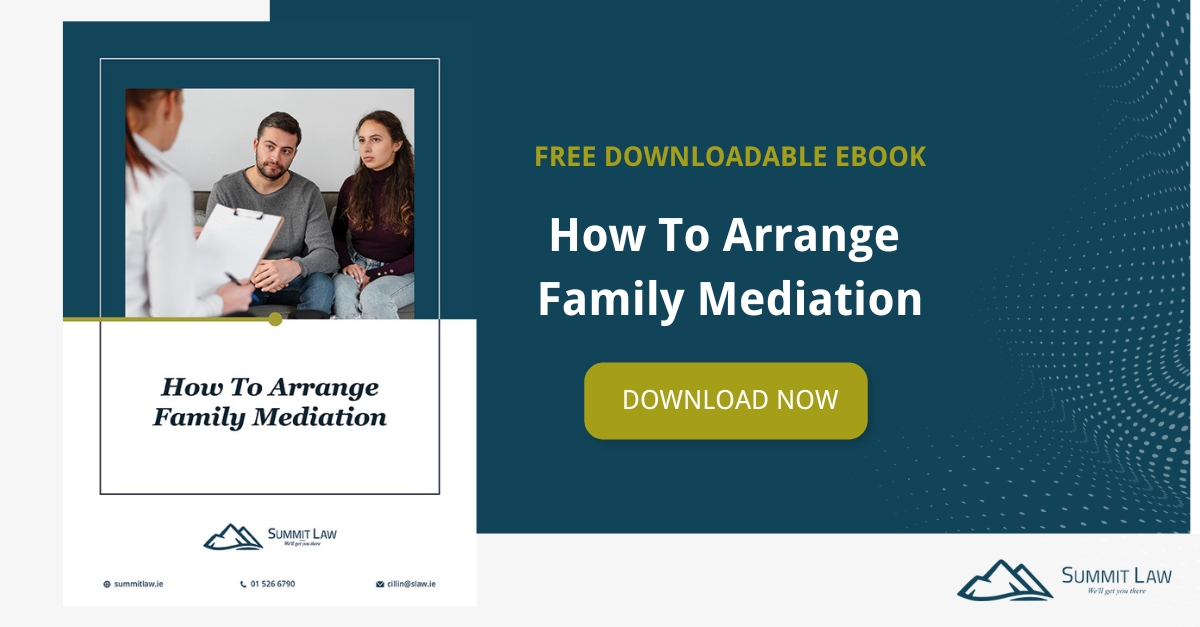A separation or divorce is an incredibly painful experience, not only for the couple directly affected but also for their children and extended families. Heartbreak aside, there may also be the messy business of dividing assets and custody arrangements to contend with. It can be hard to see the light at the end of the tunnel when faced with such considerable upheaval, but there is hope in the form of Family Mediation.
What is family mediation?
Before we define exactly what family mediation is, it’s important to address a common misconception surrounding the term. Mediation is not another word for couple’s therapy or relationship counselling; it is not designed to help mend a broken relationship.
Rather, it is a service provided to separated or divorcing couples who are trying to resolve disputes over their joint interests. With the help of a mediator to oversee the negotiation process, the goal is for both individuals to come to an agreed settlement within a safe environment, rather than taking the matter to court.
It offers former partners the chance to cut ties on their terms, with minimal emotional upheaval and in a far more cost-effective way.
Who is family mediation for?
While family mediation sometimes helps families in dispute to come to a mutual agreement, it is a service that more commonly benefits couples who have parted ways. They may be married or unmarried couples, same-sex couples, couples with children or couples with shared financial assets – the list goes on.
It doesn’t matter what the circumstances are; the core objective of family mediation is to reach an appropriate settlement outside of the courtroom.
What are the key benefits of family mediation?
At a basic level, family mediation provides an opportunity for ex-partners to make their separation as painless as possible, both for their families and for themselves.
By bringing two separated individuals together for negotiation, it encourages the repair and restructuring of once-damaged lines of communication. The presence of a trained professional, who ensures that each party’s voice is heard in equal measure, also helps to diffuse any arguments that may otherwise escalate before a compromise is reached.
In addition, a mediator provides a voice of reason, reminding couples of their priorities and responsibility to do the right thing for the right reasons, particularly where children are involved.
On that note, will children be brought into the process?
Family mediation is a particularly effective tool when used by separating couples who share children. But many parents worry about the extent of their children’s involvement in the process, and in particular, how this may affect them.
Because every family is different, mediation can be tailored to suit the preference and circumstances of each. This means that the voice of the child will be heard regardless of whether it is in session or otherwise. With the protection of the child’s well-being placed at the forefront, their best interests will always be of primary concern.
The changing needs of children as they grow up will also be taken into consideration. As time goes on and circumstances change, a mediator can once again work with the family to alter the existing arrangements in a mutually satisfactory way.
Common questions about family mediation
Those embarking on family mediation understandably have several common questions they’d like answered.
1. What’s involved in a family mediation session?
At the outset, all pressing issues to be resolved will be noted. Throughout each session, these issues will be discussed, with the mediator inviting equal input from both parties to encourage fair participation. Practical and agreeable resolutions will then be suggested and spoken about, with the main objective being to reach a viable compromise.
2. How long does the whole process take?
Given the emotionally draining nature of the mediation process, most individual sessions will not usually last longer than one hour. The amount of sessions required depends on the complexities of each case, but up to six sessions are considered standard.
3. What is the outcome of family mediation?
The best possible outcome of family mediation is that those involved will settle any disputes related to finances, property, parenting duties and more, outside of court. Any agreements made during the process will be noted on a written document, and this can be drawn into a legal contract by a solicitor.
Summit Law can help recommend Family Mediation services
At Summit Law, our team of compassionate, experienced professionals are on hand to support you as you navigate the difficult times of divorce, separation and family disputes. We are here to help you make smart decisions so you can protect your best interests and those of your loved ones.
With so much to grapple with at a time of high tension and conflict, obtaining the help of the experts is highly advisable. We advise all of our clients on a range of third-party family mediation services available to them, and whether it works at achieving the desired outcomes or not, we are here to assist them, every step of the way – in their corner, always.
So, if you need a reliable family law solicitor or a referral to the right family mediation services, contact our team today for a confidential, no-obligation consultation.




